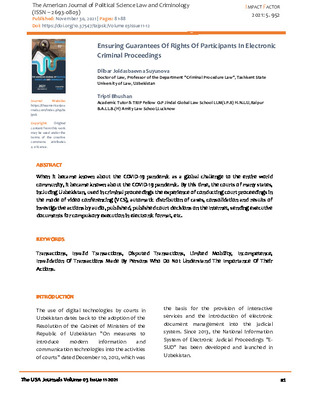Ensuring Guarantees Of Rights Of Participants In Electronic Criminal Proceedings
Abstract
When it became known about the COVID-19 pandemic as a global challenge to the entire world community, it became known about the COVID-19 pandemic. By this time, the courts of many states, including Uzbekistan, used in criminal proceedings the experience of conducting court proceedings in the mode of video conferencing (VCS), automatic distribution of cases, consolidation and results of investigative actions by audio, published, published court decisions on the Internet, sending executive documents for compulsory execution in electronic format, etc.

Downloads
Doctor of Law, Professor of the Department "Criminal Procedure Law"
Academic Tutor & TRIP Fellow O.P Jindal Global Law School LLM(I.P.R) H.N.L.U,Raipur B.A.LL.B.(H)
-
Features Of The Institution Of Prejudice In Criminal Proceedings
The American Journal of Political Science Law and Criminology: No. 06 (2021) / Dilbar Suyunova, Sarbon Uralov,
-
Prospects For The Institution Of Preliminary Hearing In Uzbekistan
The American Journal of Political Science Law and Criminology: No. 02 (2021) / Dilbar Suyunova, Bodhisatva Acharya,
Abstract
When it became known about the COVID-19 pandemic as a global challenge to the entire world community, it became known about the COVID-19 pandemic. By this time, the courts of many states, including Uzbekistan, used in criminal proceedings the experience of conducting court proceedings in the mode of video conferencing (VCS), automatic distribution of cases, consolidation and results of investigative actions by audio, published, published court decisions on the Internet, sending executive documents for compulsory execution in electronic format, etc.
References
Dagel ,P.S. (1975). Conditions for establishing criminal liability, In Legal studies, (4), 70 p.
Lebedev, V.М., (2013). Kommentarii k Ugolovnomu Kodeksu Rossiiskoi Federatsii [Commentary on the Criminal Code of the Russian Federation], Moskow, Urait, 285 p.
Suyunova D.J., Shamsutdinov B. (2021) Digitalization of Criminal Proceedings in the Context of the Coronavirus Pandemic (Covid-19) in Uzbekistan [Medico-legal Update. An International Journal] available at: http://ijop.net/index.php/mlu/article/view/2723 (accessed 18 February 2021).
Taub, A. (2020). New Covid-19 crisis: domestic abuse rises worldwide. In New York Times. available at: https://www.nytimes.com/2020/04/06/world/coronavirus-domestic-violence.html.
Suyunova, D.J. (2021) Voprosi sovershenstvovaniya ugolovno-pravovix mer dlya predotvrasheniya nasiliya v otnoshenii jenshin [Eurasian Law Journal] Ufa, available at: https://www.elibrary.ru/item.asp?id=45559037 (accessed 5 March 2021).
Suyunova, D.J. И.Ачария. Prospect For The Institution Of Peliminary Hearing in Uzbekistan [The American Journal of Political Science Law and Criminology] available at





